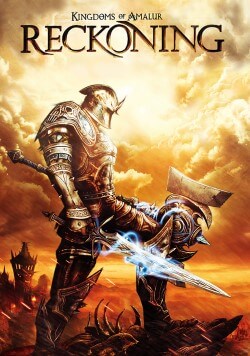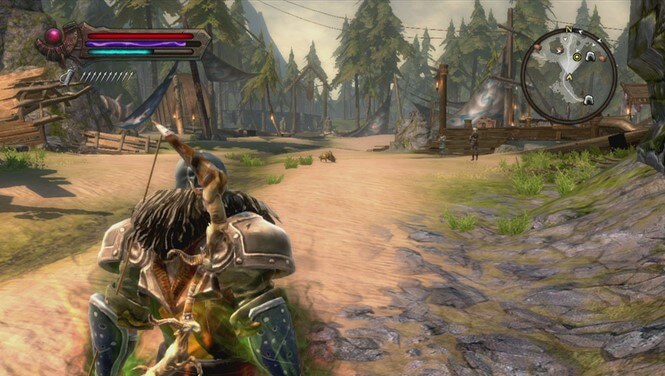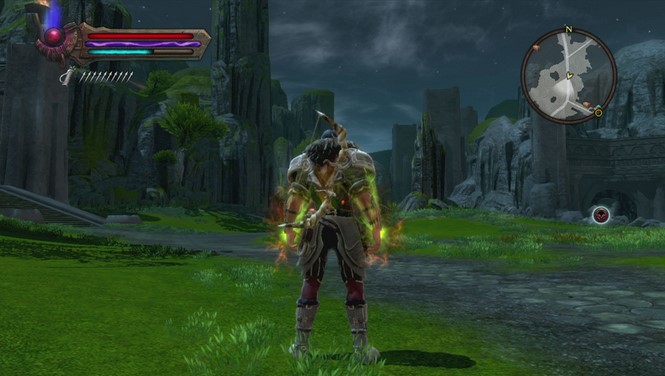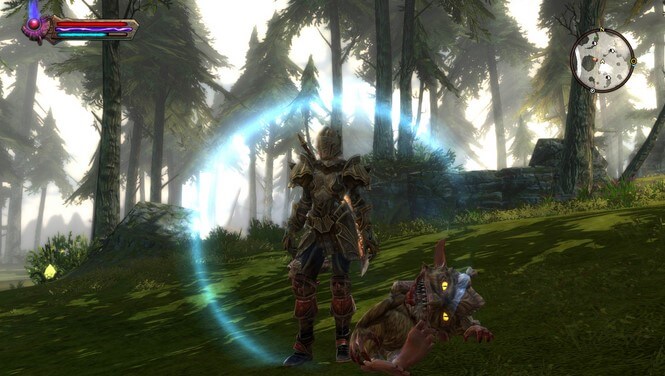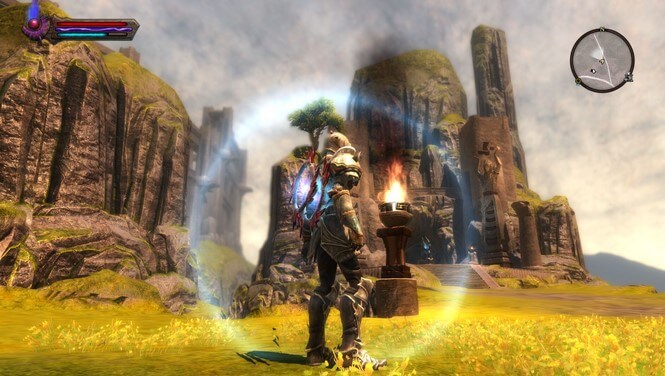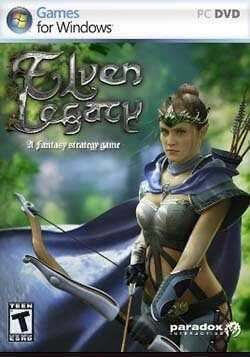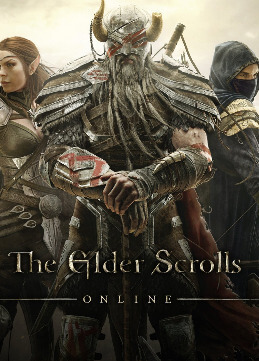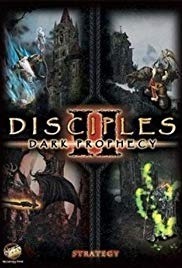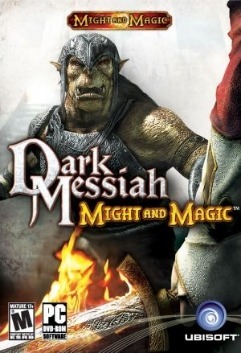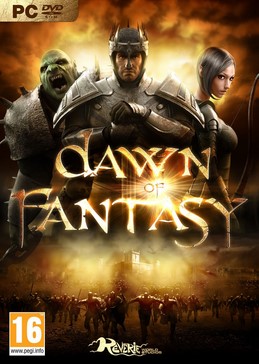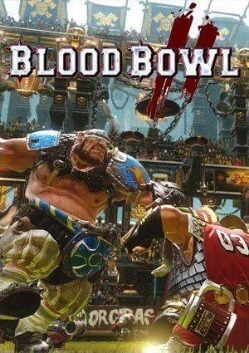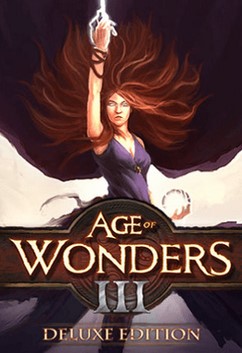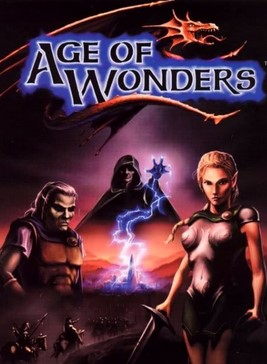Kingdoms of Amalur: Reckoning is a 2012 action role-playing video game for Microsoft Windows, PlayStation 3 and Xbox 360 developed by Big Huge Games and 38 Studios, who also published the game with Electronic Arts. It was the only game released by 38 Studios before they filed for bankruptcy.
Ken Rolston was the game's executive designer; R. A. Salvatore created the game universe and lore, with Todd McFarlane working on the artwork, and Grant Kirkhope creating the musical score. The game was released in 2012, to generally favorable yet polarizing reviews.
On September 6, 2018, the rights for the series were purchased by THQ Nordic from the now defunct 38 Studios.
Gameplay
Kingdoms of Amalur features five distinct regions, four playable races, and three class trees with 22 abilities per tree. The four playable races are the Almain (Civilized Humans), the Dokkalfar (Dark Elves), the Ljosalfar (Light Elves), and the Varani (Nomadic Humans).citation needed The player starts off as a "Fateless", but can afterwards choose a class among the three available in the game, which are called Might, Finesse, and Sorcery; they correspond to the fighter, rogue, and mage classes respectively. As the player fights and gains experience, additional levels are unlocked. With each level gained, the player gains three ability points which can be invested in the skill-tree system to unlock or augment the 22 abilities, or put points into one of the other trees. By completing Faction quests and investing ability points in certain amounts in minimum combinations in the various skill trees, the player can also unlock various "destinies", which add positive buffs to the player.
Combat is based on the timing of button presses, similar to an action role-playing game, with occasional quick time event cutscenes. The combat includes a 'fate' system which allows players to accumulate 'fate points' and ultimately enter 'Reckoning Mode', a slow motion mode that allows the player to quickly dispatch enemies. The Reckoning Mode may end on player's command, with the depletion of the fate bar or by the act of 'Fateshifting' an enemy. Fateshifting involves performing a brutal finishing move on a single enemy. During the cosmetic Fateshifting phase, the player may rapidly tap a random button (chosen and displayed by the game) to increase the experience yield up to 100%. After the Fateshifting, all weakened enemies also die.
The player can travel on land, jump down from predesignated spots and swim in the water. The player has the ability to communicate with, rob or kill NPCs; each of these actions have their own consequences. Lead combat designer Joe Quadara emphasized that "twitch skill is only going to get you so far. Strategy and proper RPG playing is going to get you farther." 38 Studios founder Curt Schilling said that the style of the game would be a marriage between God of War and The Elder Scrolls IV: Oblivion.
Weapons and armors can be purchased from shops, looted from fallen enemies or discovered among hidden treasures. Rarer and better ones are awarded as part of quests. However, the best weapons and armors are only achieved through crafting. While high-quality crafting material are rare and expensive, the extended length of the game means that the player inevitably comes into possession of an inordinate number of weapons and armors, from which the needed crafting parts can be salvaged. Thus, the necessary high-quality crafting material are bound to occur. In addition, the crafting quality depends on two of the player character's skills: "Blacksmithing" and "Sagecraft". Each of these can be upgraded throughout the course of the game up to ten levels. The former is directly involved in improving the results of salvaging or crafting, while the latter improves the ability to create magical gems. These gems can be inserted into socketed gears, or consumed during the crafting process for their magical properties.
Synopsis
Setting
Reckoning is set in the Faelands, one of the Kingdoms of Amalur and home to the immortal Fae of the Summer and Winter Courts. Immortality doesn't mean that they cannot die, it means that their essence will be reborn in another body, repeating the past, endlessly. The Faelands are divided into a number of separate regions; the forests of Dalentarth, the Plains of Erathell, the canyon territories of Detyre, the marshes of Klurikon and the crystal kingdom of Alabastra. Throughout the Faelands exist settlements belonging to the mortal races: the human Almain and Varani; the Ljosalfar and Dokkalfar, light and dark Alfar (elves) respectively; and the gnomes. It is these mortal races that the Gadflow's Tuatha Deohn – corrupted Winter Fae – seek to exterminate in their "Crystal War", not only in the Faelands but in the neighbouring kingdoms as well.
Amalur is also home to a species of supernaturally-gifted people called "Fateweavers." Fateweavers can look into an individual's future and tell what they see, often with special attention paid to the individual's eventual death. For a number of years before the game's outset, the fate of everyone in the Faelands has been, "Slain by the Tuatha Deohn," suggesting that the Winter Fae will win their war of conquest.
Plot
Kingdoms of Amalur: Reckoning follows the story of a mortal known as the "Fateless One", who, having died before the game's outset, is revived in the experimental Well of Souls by the gnomish scientist Fomorous Hugues. The first and only success of the experiment, the Fateless One must escape the facility when it comes under attack by the Tuatha Deohn, a subsect of the immortal Winter Fae, who are currently waging a "Crystal War" on all the mortal races in the name of their new god "Tirnoch". Having escaped the facility, the Fateless One – having no memory of their life before their death – is briefed on the intricacies of the Faelands and the Tuatha Deohn's ongoing war by Agarth, a Fateweaver. Agarth is astounded and pleased to realize that he cannot read The Fateless One's future: having already died, the Fateless One's return from the grave has taken them out of "Fate's weave"; theirs is the only life in the world without a predetermined end. This power also allows the Fateless One to alter the fates of others, as Agarth discovers when the Fateless One saves him from his fated, "lonely" death at the hands of a native creature.
